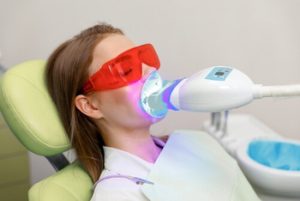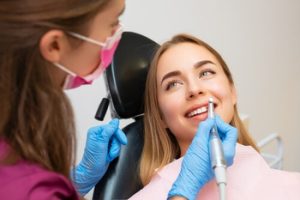Teeth whitening, a sought-after solution for achieving that dazzling, pearly white smile, has become increasingly popular. But with so many options available, it’s only natural to wonder, “Is teeth whitening safe?” Let’s dive into the world of tooth whitening treatments, exploring the ins and outs of the process, the potential risks, and how to ensure the best results—all while keeping your smile’s health in mind.
What Does Teeth Whitening Involve?
Teeth whitening involves bleaching your teeth to make them lighter. The process doesn’t change the colour of your teeth entirely, but it lightens the existing shade, giving you a whiter, brighter smile. These treatments’ most common active ingredients are hydrogen peroxide or carbamide peroxide, which work
When you opt for a tooth whitening treatment, the procedure generally involves applying a whitening gel to the surface of your teeth. This gel, often containing either hydrogen peroxide or carbamide peroxide, breaks down into oxygen molecules, penetrating the tooth enamel and lifting surface stains. This is how teeth whitening works, giving your teeth a brighter and whiter look. Whether you’re considering an in-office treatment or a home teeth whitening kit, it’s essential to understand the process and the potential effects on your oral health.
The Safety of Teeth Whitening: Should You Be Concerned?
One of the most common questions people ask is, “Is teeth whitening safe?” The short answer is yes—teeth whitening is generally safe when done correctly. However, it’s crucial to approach the treatment with care and follow the advice of a dental professional to avoid potential risks such as tooth sensitivity or gum irritation.
While the Australian Dental Association endorses teeth whitening as safe, it’s essential to note that not all teeth whitening products are created equal. Over-the-counter whitening strips and kits may not offer the same level of safety as treatments supervised by a dentist. In-office whitening treatments performed by a dentist are designed to protect your tooth enamel and minimise any discomfort. It’s always a good idea to talk to your dentist before starting any whitening procedure, especially if you have health conditions that might affect the safety of the treatment.
Understanding the Different Types of Teeth Whitening Treatments
When it comes to whitening your teeth, several options are available, each with its own pros and cons. Let’s break down the most common types of teeth whitening treatments and what you can expect from each.
In-Office Whitening Treatments
These are typically the most effective and quickest way to whiten your teeth. A dental professional applies a high-concentration bleaching gel to your teeth and may use a special light or laser to enhance the whitening process. This type of treatment can lighten your teeth by several shades in just one visit, making it perfect for those looking for immediate results. However, it can also be more expensive than other options.
At-Home Whitening Kits
Over-the-Counter Whitening Products
Whitening strips, whitening toothpaste, and other over-the-counter products are readily available and can be a more affordable option. When considering whitening teeth with these products, it’s important to evaluate their effectiveness and safety. However, these products often contain lower concentrations of bleaching agents, so they might not be as effective as professional treatments. Additionally, because they are not tailored to your specific dental needs, they may pose a higher risk of irritation or damage if not used correctly.
Whitening Toothpaste and Whitening Mouthwashes
These products are designed to help maintain the results of a whitening treatment or to lighten teeth gradually over time. Undergoing a tooth whitening session can offer significant benefits, such as a brighter smile, but may also cause temporary sensitivity immediately after the treatment. They typically contain mild abrasives that polish the teeth and small amounts of hydrogen peroxide or other whitening agents. While they are safe for everyday use, they won’t provide the dramatic results that professional whitening treatments offer.
Potential Risks and How to Mitigate Them
While teeth whitening is generally safe, potential risks are involved, especially if the procedure is not done correctly. Tooth sensitivity is one of the most common side effects, particularly for those with pre-existing sensitivity issues. This occurs because the bleaching agents can temporarily weaken the tooth enamel, making your teeth more sensitive to hot, cold, or sweet stimuli.
To minimise tooth sensitivity, consider using toothpaste designed for sensitive teeth in the weeks before your whitening treatment. Additionally, your dentist may recommend fluoride treatments to strengthen your enamel before the procedure.
Gum irritation is another potential side effect, particularly if the whitening gel touches your gums. To avoid this, ensure that any at-home whitening kits you use include trays that fit your teeth properly. A professional treatment, supervised by a dentist, will involve using a protective gel to shield your gums during the whitening process.
It’s also important to know that teeth whitening treatments are unsuitable for everyone. For instance, if you have crowns, veneers, or fillings, these won’t whiten like your natural teeth. People with gum disease or other dental health issues should resolve these issues before pursuing a whitening treatment. Always talk to your dentist before starting any whitening procedure to ensure it’s the right choice.
Maintaining Your Whiter Smile
Once you’ve achieved your preferred level of whiteness, you’ll want to maintain your brighter smile for as long as possible. While teeth whitening can last several months, depending on your lifestyle habits, it’s essential to take steps to preserve the results.
Avoid the intake of foods and beverages that can possibly stain your teeth, such as coffee, tea, red wine, and certain fruits. If you do indulge, try to brush your teeth or rinse your mouth with water shortly afterwards. Additionally, using whitening toothpaste can help maintain your smile between professional treatments.
It’s also worth noting that touch-up treatments may be necessary to keep your teeth looking their best. These can be done using an at-home kit provided by your dentist or by scheduling periodic in-office whitening sessions.
The Final Word: Is Teeth Whitening Worth It?
To sum up, teeth whitening can be a reliable and efficient method for attaining a brighter smile, provided you proceed with the treatment carefully and under the supervision of a dental professional. Whether you opt for an in-office treatment, an at-home kit, or over-the-counter products, it’s essential to adhere to the instructions closely and be aware of the potential risks.
So, is teeth whitening safe? When done correctly, the answer is a resounding yes. With the right approach, you can achieve the pearly whites you’ve always wanted and enjoy a whiter, more confident smile for years to come.
If you’re considering teeth whitening and want professional advice tailored to your specific needs, don’t hesitate to contact us at Southport Park Family Dental. We’re here to help you achieve the bright, confident smile you’ve always wanted. Give us a call at 07 5655 7688 to schedule a consultation today!
References:
GoodRx. (n.d.). Best whitening toothpastes: Most effective and affordable options. Retrieved from https://www.goodrx.com/conditions/dental-care/best-whitening-toothpaste
Healthline. (n.d.). How does teeth whitening work? Retrieved from https://www.healthline.com/health/how-does-teeth-whitening-work
Verywell Health. (n.d.). The side effects from tooth whitening. Retrieved from https://www.verywellhealth.com/the-side-effects-from-tooth-whitening-1059029








